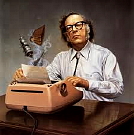The Right Answer by Isaac Asimov

By Isaac Asimov
This article first appeared in The Final Magic Fantasy Collection by Isaac Asimov, published in 1996 by Harper Prism. Used with permission by the Estate of Isaac Asimov.
The number of general conclusions one can come to about the Universe, or about any significant part of it, is usually limited, and the various sages of the world, past and present, have (with their eyes closed and their intuitions working) come up with every one of them.
It follows, then, that whatever conclusion scientists arrive at concerning anything, it remains always possible to quote some item in Eastern speculation or Celtic mythology or African folklore or Greek philosophy, that sounds the same.
The implication on making the comparison is that scientists are foolishly wasting a lot of money and effort in finding out what those clever Eastern (Celtic, African, Greek) sages knew all along.
For instance—
There are exactly three things that might be happening to the Universe in the long run.
- The Universe may be unchanging on the whole and therefore have neither a beginning nor an end.
- The Universe may be changing progressively, that is in one direction only, and therefore have a distinct beginning and a different end.
- The Universe may be changing cyclically, back and forth, and therefore ends at the beginning and starts over.
All the sages who have speculated on the Universe intuitively must come up with one of these three alternatives and, all things being equal, there is a one-in-three chance of their having duplicated whatever conclusions science eventually comes to on the subject.
At the present moment, scientists are inclined to accept the second alternative. The Universe seems to have begun in a big bang and to be changing progressively so as to end in infinite expansion and maximum (with or without black holes).
If you pick out the proper verses of the Bible, then, and interpret them with sufficiently ingenuity, you can maintain that the Bible says the same thing. All you need to do is to decide, for instance, that “Let there be light” is the theological translation of “big bang” and that six days is not very different from fifteen billion years and you can freely state the latest astronomical theories support Genesis.
What characteristics the value of science is its methodology, the system it uses to arrive at those conclusions.
A hundred sages, though speaking ever so wisely, can never offer anything more persuasive that an imperative “Believe!” Since human beings can be found to believe each of the hundred, there are endless quarrels over points of doctrine, and people have hated vigorously in the name of love and have murdered enthusiastically in the name of peace.
Scientists, on the other hand, begin with observations and measurements and deduce or induce their conclusions from that. They do so in the open and nothing is accepted unless the observation and measurement can be repeated independently. Even then the acceptance is only tentative, pending further, better, and more extensive observations and measurements. The result is that despite controversy in the preliminary stages a consensus is arrived at eventually.
Consequently, what counts about science is not that it has currently (and tentatively) decided that there was a big bang; what counts is the long chain of investigation that led to the observation of the isotropic radio wave background that supports that conclusion.
What counts is not that science has currently (and tentatively) decided that the Universe is changing progressively by way of an apparently endless expansion; what counts is the long chain of investigation that led to the observation of red-shifts in a galactic spectra that supports that conclusion.
Don’t tell me, then, that those clever Eastern (Celtic, African, Greek, or even Biblical) sages have spoken of something that sounds like the big bang or like endless expansion. That’s idle speculation.
Show me where those sages worked out the isotropic radio wave background, or the red-shifts in galactic spectra, which alone support those conclusions on anything more than mere assertion.
You can’t. Science stands alone!
Dr. Isaac Asimov is one of the most prolific writers of all time, having written or edited over 500 books and 9,000 letters. He is best known as the author of I, Robot and the Foundation series. He was the 1984 Humanist of the Year and honorary president of the American Humanist Association from 1985 until his death in 1992.
